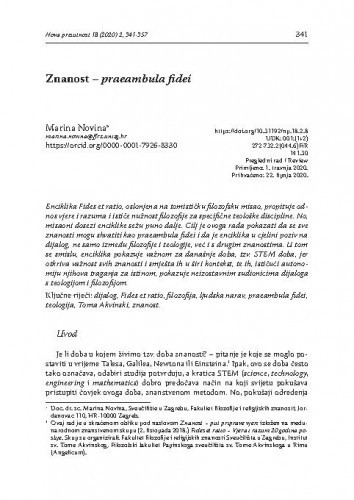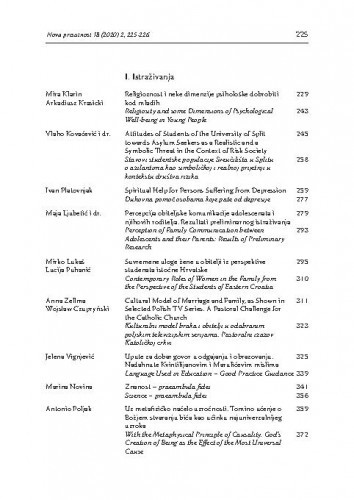Enciklika Fides et ratio, oslonjena na tomističku filozofsku misao, propituje odnos vjere i razuma i ističe nužnost filozofije za specifične teološke discipline. No, misaoni dosezi enciklike sežu puno dalje. Cilj je ovoga rada pokazati da se sve znanosti mogu shvatiti kao praeambula fidei i da je enciklika u cjelini poziv na dijalog, ne samo između filozofije i teologije, već i s drugim znanostima. U tom se smislu, enciklika pokazuje važnom za današnje doba, tzv. STEM doba, jer otkriva važnost svih znanosti i smješta ih u širi kontekst, te ih, ističući autonomiju njihova traganja za istinom, pokazuje neizostavnim sudionicima dijaloga s teologijom i filozofijom.; The encyclical Fides et ratio is based on Thomistic philosophical thought. It questions the relationship between faith and reason and emphasizes the necessity of philosophy for specific theological disciplines. However, in this research we show that the encyclical’s thinking reaches far beyond. The analysis of the text of chapter six has shown that the encyclical emphasizes that (1) faith cannot give up reason, which limits itself from fideism. Also (2) that reason by faith strengthens itself to reach the goals it could not achieve, which represents (a) moving away from rationalism and scientism, and (b) giving reason a dimension of openness to the divine nature, revealing it as a link between nature and the divine nature. However, on the line of Thomistic thought the encyclical adds (1) that there are some truths that can be learned naturally, on the independent path of rational inquiry that does not have to divert from one’s own principles and autonomy, and that (2) the knowledge of these truths necessarily precedes the acceptance of God’s revelation. These truths represent the path of preparation for faith. Furthermore, relying on Aquinas’s metaphysic, psychology and philosophy of mind, the encyclical stresses that grace perfects nature (FR, no. 75) and that there is distinction between two lines of cognition (FR, no. 54). But these two lines of cognition are not mutually exclusive, but complementary and revealing (a) that the search for a natural foundation of meaning is one of the most important points of this encyclical and (b) the necessity of a dialogue between theology and philosophy. However, among the autonomous natural paths of cognition, which are defined by the term »the path of preparation for the faith«, which refers to the medieval term »praeambula fidei« (FR, no. 67), we also recognize the sciences that aim at natural cognition. Thus, the reach of the encyclical is expanded.
Sažetak

 Nova prisutnost : časopis za intelektualna i duhovna pitanja : 18, 2(2020) / glavna i odgovorna urednica, editor-in-chief Katica Knezović.
Nova prisutnost : časopis za intelektualna i duhovna pitanja : 18, 2(2020) / glavna i odgovorna urednica, editor-in-chief Katica Knezović.